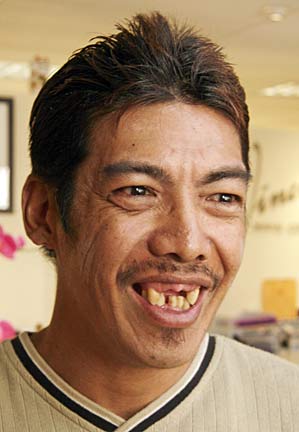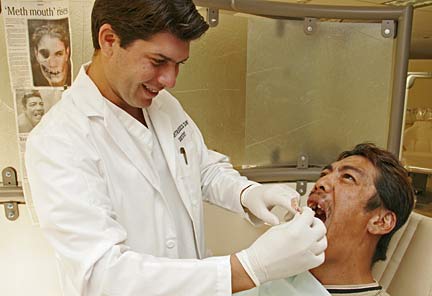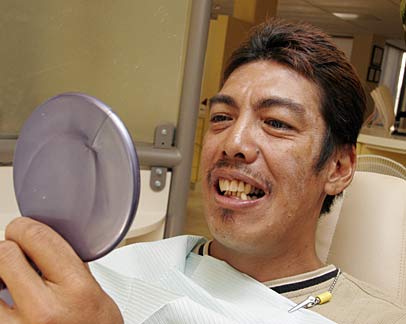
|
Addict about-face
A former "ice" user celebrates
his recovery with a clean
and sober set of teeth
Casey Kunishige has a lot to smile about, starting with new teeth. The 42-year-old's mouth was full of rotten teeth and diseased gums from using crystal methamphetamine, a condition known as "meth mouth."
He left da Vinci Dental Center beaming this month after Dr. Peter Kyriakakis fitted him with two partial dentures to replace 10 extracted teeth.
"I waited so long for this, to get teeth," Kunishige said, baring them in a hand mirror at the dentist's office. "More than half my life, I didn't have teeth. They started to deteriorate and just kept falling out."
Kunishige talked about his 15-year addiction to ice in a Star-Bulletin interview in June. He was recovering from substance abuse at Hina Mauka, a residential treatment center in Kaneohe.
Now he's an outpatient, living in a clean and sober house in the area, working for International Tile and returning to the Hina Mauka program three nights a week.
His 23-year-old daughter recently came to see him from Hilo, he said. "It's the first time she's ever seen me sober. She was so happy. She said she has a real dad now. It touched me really hard."
Kunishige returned to Hilo recently to visit his family and celebrate the second birthday of twin grandchildren.
He hadn't been back to his home island since he was admitted to Hina Mauka in April, two weeks after entering the detox unit in Hilo Hospital on Easter Sunday, March 27.
The last time he smoked crystal meth was in the Hilo hospital parking lot on Easter when he decided he "had enough of that kind of life," he said.
"It's been a blessing -- the best thing I did in my whole life. I made the decision on my own."
He said he told the social worker at the hospital he wanted to go to a treatment facility away from Hilo because "anywhere I go at home, it's like a trigger."

In May, Kunishige began visiting Dr. Peter Kyriakakis, above, at da Vinci Dental Center, where he has been fitted with dentures to replace 10 pulled teeth, below.

"Thinking has been a big factor in my recovery," he said. "It (the program) changed how I think now, how I used to respond to things before. I learned to deal with things that come up. You have to want it and work the program. I wanted it in the worst way."
He said he's "living healthy." He put on 30 pounds "from eating regular," moving up two sizes in jeans, and is lifting weights.
He's an experienced installer of ceramic tile, and a fellow member of Alcoholics Anonymous got him his new job at a tile company. "I install, and this is distributing, but it's good for me right now," Kunishige said. "It's the same industry as what I love to do. I'm real happy for it.
"At first I thought I wouldn't be able to work like I used to," he said. "I used to depend on alcohol and drugs to work, to keep me going."
He's found, however, that he works a lot better now. "I remember things. I've got physical conditioning. It keeps me going. I was run-down, burned out. Now everything has changed tremendously."
He said his father visited him from Kona and they went to lunch. "He ordered me a beer by mistake. I said, 'Dad, you've gotta drink it. I prefer not to now.'"
Kunishige is still smoking cigarettes, but is trying to quit, "especially after my teeth were cleaned."
He began going to da Vinci Dental Center on May 12 to try to fix his damaged teeth.
Peter Kyriakakis, who operates the center with his brother, Nicholas, said Medicaid covered the extractions and he made fee arrangements with his patient for the other dental work.
He said Kunishige "had been living with pain a lot." He had rampant decay and his teeth were misaligned, black with tartar and dirt, and he had severe gum disease.
"It's not like the drug directly rots the teeth," Kyriakakis explained, but substance abusers, particularly with crystal meth and heroin, don't take care of their mouth.
"If you don't take out the teeth that are sick, it will lead to serious infections. It can be life-threatening."
He said Kunishige was so motivated to have his teeth repaired that he missed only one appointment.
Kyriakakis removed the worst 10 teeth, and "saved teeth most people would have taken out, so he had something left to eat with." He scaled others to remove the tartar and address the inflammation and gum disease.
He made a partial denture for the upper front teeth and one for the lower back teeth.
"You've got to get used to them," he told Kunishige. "They're not perfectly straight, so they look natural, really good."
Now that his gums are restored and he's drug-free, Kunishige only has to follow a maintenance schedule, Kyriakakis said.
"He's going to find that people treat him much differently," the doctor added. "They're going to look at his eyes, not his teeth."
E-mail to City Desk
[News] [Business] [Features] [Sports] [Editorial] [Do It Electric!]
[Classified Ads] [Search] [Subscribe] [Info] [Letter to Editor]
[Feedback]
